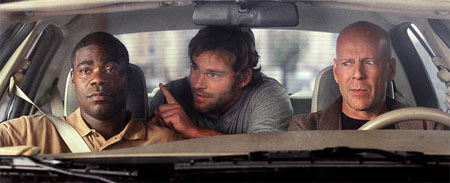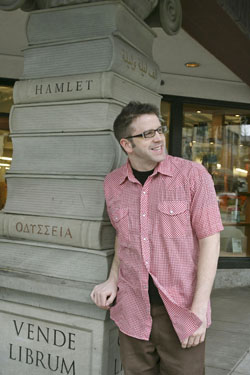
As suggested by Peter Biskind’s Down and Dirty Pictures, Steven Soderbergh initiated his “one for us, one for them” plunge into the Hollywood ocean with 1998’s Out of Sight. Richard Linklater’s occasional dips began with 2003’s School of Rock. Both were perfectly respectable movies, but it wasn’t much of a surprise when these distinctive directors’s later compromises floundered. Now Kevin Smith, a tardy arriviste into the strange club of indie filmmakers turned hired hands, has copped a Hollywood feel with Cop Out, a buddy movie that so desperately wants to be Beverly Hills Cop or Fletch (even composer Harold Faltermeyer has been coaxed out of near-retirement to score this flick), but that squeaks like some by-the-numbers franchise sequel co-directed by Brett Ratner and Abraham Zapruder. Cop Out is a hack movie directed as if it were a home movie, a big shaggy dog that really, really wants to be loved. One feels a bit embarrassed watching Smith attempt to put together a car chase, relying on a routine vehicle spin to win some half-baked sense of excitement. And the film’s firm commitment to choppy amateurism is equally evident in the sloppy attention to detail. There’s one scene where, in a stunning display of shoddy script supervision, a slice of pizza disappears from Kevin Pollack’s right hand. In a later shootout, there’s a lazy nod to John Woo’s double-fisted gunning. The visual palette is, as expected, little more than static shots and long takes, with half-hearted efforts at a TV-friendly color scheme. A primitive amber aura for a restaurant showdown. Willis backlit by blue in a bar. These are a student filmmaker’s templates. With eight feature films under his belt, the fair pass that Smith has received for this type of shoddy camerawork must end. It doesn’t help that Smith has this tendency to film his actors with all that dead space at the top of the frame, as if these characters are awaiting some comic book caption or the audience is enduring some bumbling community theater production.
On the other hand, if the Hollywood hostlers give you a cliche-ridden horse (“These assholes are crazy, brother,” reads one of the unnecessary Spanish subtitles) saddled with dated cultural references (the first ten minutes is a tedious farrago of movie quotes and the film’s later use of “All your base are belong to us” is so 2001), why not direct it like a home movie? Unlike Brett Ratner’s films, one can safely assert that home movies emerge from good intentions. Smith is known for badgering his poor actors into highly specific and highly unnatural line delivery. But Bruce Willis, perhaps because he is too big a star to be prodded by an unambitious filmmaker, plays a very good straight man. He reacts to the anarchy around him with John McClane-like head cocks and James Cole-like introspection. Tracy Morgan, whom I’ve long suspected is more than the loudmouth immortalized on 30 Rock and Saturday Night Live, is refreshingly played against type. His character is given numerous opportunities to spout obscure facts and his monologue with a teddy bear nannycam should not work as well as it does. The material is weak, but Morgan thankfully isn’t. Worrying about his wife’s possible infidelities, Morgan momentarily turns a character who might have become a stock wiseacre into a bustling bundle of neuroses. The film is also wise enough to cast the ass-kicking Susie Essman in a small role. Unfortunately, the underrated Seann William Scott, who showed that he was far more than Steve Stifler in the little-seen 2008 film, The Promotion, is given very little to work with.
I can’t say that I hated this movie — certainly not as much as the people around me. But I also can’t say that I loved the movie either. I’m as fond of crass humor and dick jokes as the next guy. And to ensure that I absconded with any lingering pretensions, I took along the thriller novelist Jason Pinter to the screening. But he felt the same way. While there are a few funny moments, there isn’t a single gag in this movie that is as creative or as funny as Axel Foley stuffing hot dogs up a tailpipe. And while Morgan may have energy, despite my praise for what he does with the material (including a funny scene where he insensitively crunches on tortilla chips), he’s simply not given much of a character to work with. Sitting in a hotel room with a sexy woman has only so many variations before the material gets old. And say what you will about 1985’s Fletch, but Chevy Chase owned that role, even if the script wasn’t nearly as good as Gregory McDonald’s books. Willis may anchor this movie with his serious presence, but because Cop Out hasn’t been written to fit Morgan, what should have been a breakout role for him devolves into more of the same. He’s far more interesting than Chris Tucker, but, unfortuantely, thanks to writers Robb Cullen and Mark Cullen, he’s just as forgettable.
Smith, of course, came very close to rebooting Fletch for the big screen, with Jason Lee set to play McDonald’s famous reporter. And the closing credits, just before a scene set in a morgue, grace us with Stephanie Mills’s “Bit by Bit,” the theme song from Michael Ritchie’s 1985 movie. Clearly, Cop Out, a film that more than lives up to its title, must have appealed to Smith as a fun substitute for the aborted Fletch remake. (Indeed, Smith took a reported pay cut to ensure the R rating, although the film flinches from depicting violence and is about as safe as a PG-13 movie.) But if Cop Out is the lackluster result, it appears that audiences may have dodged a bullet.

 Correspondent: What was it about the radio school instructor’s body language that suggested “a few divorces in his past?”
Correspondent: What was it about the radio school instructor’s body language that suggested “a few divorces in his past?”
